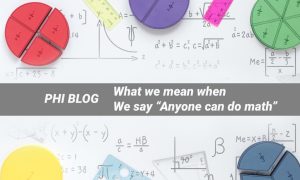We need to unpack the phrase, and attendant phrases, that are so popular today, and that are in some ways so radical and unintuitive that we both believe and disbelieve them at the same time.
- Anyone can do math
- Everyone is a mathematician
- You are good at math (and do not know it)
- There is no such thing as a math person. Everyone can do the math!
And so on. These are correctives, and important ones, to another, an earlier set of problematic (and faulty) axioms, that assumed the world is divided up into “math people” and “I’m-not-a-math-person” people. Some multitudes believe they cannot do the math when they suffer only from corrosive classroom experiences. Nevertheless, too unthinking an embrace of these taglines is problematic too.
The current excitement around growth mindset in classrooms around the world is meant, partly, to prevent math class from being a place where you get identified as a person who either has or doesn’t have the “math gene” (another discredited concept) and sorted accordingly into the appropriate track. Then students who are fast and know their facts are fast-tracked into more challenging and exciting mathematics, while folks who are slower or do not have the facts down are placed in lower, slower tracks, and get the message that they do not belong in the subject.
However, we have a way of overcorrecting. A growth mindset is effectively a positive and useful outlook, but right now there is a risk it gets overapplied (and under-understood) and becomes another educational fad that backfires in implementation.
When we say anyone can do the math, what do we actually mean?
If we are saying that everyone is equally talented mathematically, then we are lying. And kids know this. You know it too. There are people who have unusual insights or abilities in mathematics. Some (e.g., Ramanujan, Nash, Turing, Johnson) get their movies. And speaking of movies, that anyone can do math line has a counterpart in the movies, in Pixar’s Ratatouille. There, the line is anyone can cook.
“Not everyone can become a great artist- but a great artist can come from anywhere”
Ego, from Ratatouille
Ego’s parsing of the phrase anyone can cook is not apparent, and it is not the primary meaning of the phrase. The truth is, there are three meanings all wrapped up there: anyone can learn to have the joy and pleasure of cooking in their life, even if they do not become a master chef. Some people will get serious about it. And the visionaries who change the way we think about the art can come from anywhere – lock them out of the field, and we all suffer.
This is what we have to mean when we insist that anyone can do the math. For it to be more than an empty platitude, or a blatant falsehood, we have to be precise.
What does anyone can do math really mean?
1. Everyone is capable of mathematical literacy. In other words, everyone can learn the foundational mathematics that allows them to understand and participate in our (increasingly data-heavy) world. Everyone is capable of doing arithmetic, understanding fractions, percents, basic algebra and graphing, basic probability and statistics, and should be able to read a graph in a newspaper or hear a statistic on the radio without getting flustered. They should know that they can understand the vast majority of the math that surrounds them in the world if they decide to put in the work. This means they should have the numeracy to participate as citizens in our society, and also to pursue the career path of their choice. (It is shocking how many people literally give up on their dreams because it requires them to take too many math courses.)
2. Everyone deserves to see some beautiful ideas of mathematics. Just like we send students on field trips to museums and have them read great poems and novels, part of their human inheritance is exposure to breathtaking mathematical ideas. The fact that people respond with panic rather than wonder is a sign that we are doing something wrong.
3. A great mathematician can come from anywhere. We all have biases about what mathematicians are supposed to look like, and also what students who are “good at math” are supposed to look and act like. We need to teach like anyone and everyone in our classroom could have a gift for math that’s about to manifest because they just might, and we may never know unless they are given the opportunity.
What we should all be shooting for is a world where everyone is mathematically literate, and where fear or anxiety around mathematics does not prevent people from doing the things they dream of doing. Everyone should see some beautiful mathematical ideas and know what it feels like. And if we can do that, we will also see excellent mathematical arising from all corners of our society and classrooms. Because there are kids who have a gift for or love of mathematics which we are not reaching yet.
Not everyone is equally gifted in mathematics. But there are reasons to teach as everyone could be.
Source Credit: mathforlove.com
LEARN MORE with PHI best Maths books on several areas of mathematics like Numerical analysis, graph theory, differential equations, linear algebra, engineering mathematics and many more…
Buy Mathematics books online from www.phindia.com
